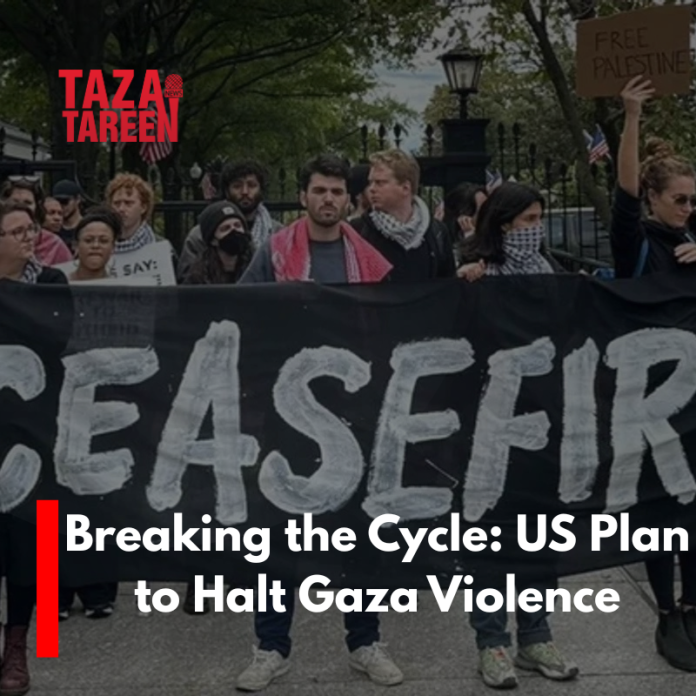The US has proposed a new 60-day ceasefire in Gaza to stop the ongoing war between Israel and Hamas. This peace plan includes a major hostage-prisoner exchange and promises to send more humanitarian aid to Gaza.
What Does the US Peace Plan Say?
Under the US proposal for Gaza:
-
In the first week, Hamas will release 28 Israeli hostages (some alive, some dead).
-
In return, Israel will release 1,236 Palestinian prisoners and return the bodies of 180 Palestinians.
-
Once the deal is signed, the United Nations and other relief agencies will immediately send aid to Gaza.
Israel’s Approval
Israeli officials have agreed to this 60-day ceasefire deal in Gaza. Prime Minister Benjamin Netanyahu informed the families of the hostages that US President Donald Trump, Egypt, and Qatar helped create the agreement.
Hamas Responds
The Palestinian group Hamas says they received the offer, but they are not fully satisfied. They say the plan does not meet their key demands, which include:
-
A complete end to the war.
-
Full withdrawal of Israeli forces from Gaza.
-
An end to the humanitarian crisis in Gaza.
A senior Hamas leader said they are still reviewing the proposal carefully.
What Happens if the Ceasefire is Accepted?
-
Israel will stop military actions in Gaza immediately.
-
The Israeli army will withdraw gradually from Gaza.
-
Hamas will release the remaining 30 Israeli hostages once both sides agree to a permanent ceasefire.
-
Peace talks may continue during the 60-day pause.
But a major roadblock is that Israel wants Hamas to surrender all weapons, while Hamas refuses and demands a full end to the war first.
Verified Details on the Gaza Peace Efforts
Ceasefire Includes Monitoring Mechanism
-
Ceasefire implementation will likely include international monitoring teams to ensure compliance by both sides. (Source: Diplomatic correspondences via Reuters reports)
Involvement of Egypt and Qatar
-
Egypt and Qatar are actively involved in mediating the terms of the truce and are pressuring Hamas to respond positively.
Media Access to Gaza
-
The ceasefire may allow limited access to international media to enter Gaza and report on the ground realities, increasing global transparency.
Limit on Airstrikes and Surveillance
-
During the ceasefire, Israel is expected to significantly reduce or suspend its surveillance drones and airstrikes.(Source: Strategic policy notes from UN-affiliated sources)
Focus on Women and Children
-
Hostage release negotiations reportedly prioritize women and children first for early release from both sides.
Infrastructure Access
-
If the ceasefire holds, UNRWA and aid groups can start rebuilding schools, hospitals, and shelters in north Gaza.
Potential Extension Beyond 60 Days
-
US officials hinted that they would extend the 60-day truce if they find the humanitarian and political progress satisfactory. (Source: US State Department press briefing)
Ceasefire Could Ease Regional Tensions
-
The US believes that success of this 60-day ceasefire plan in Gaza could reduce wider Middle East tensions, especially with Iran-linked groups in Lebanon and Syria.
Background of the Gaza War
This war started on October 7, 2023, when Hamas attacked Israel, killing 1,200 people and taking 251 hostages. In response, Israel launched a military campaign in Gaza.
According to Gaza’s health authorities, over 54,000 Palestinians have died since then, and the region is now in ruins.
Global Pressure to End the War
International pressure is increasing. Many European countries and the United Nations are urging Israel to allow more food and medical aid into Gaza. The UN says Gaza is now “the hungriest place on earth.”
Humanitarian Aid Situation
A group called the Gaza Humanitarian Foundation (GHF), supported by the US and Israel, says it delivered 1.8 million meals this week. But many aid agencies say the help is not enough.
On Tuesday, desperate crowds stormed food distribution points, forcing security to pull back. These scenes have pushed global leaders to demand more food aid and a complete halt to the violence.
Final Hopes for Peace
US envoy Steve Witkoff said the US is close to finalizing this Israel-Hamas ceasefire agreement and hopes it will lead to long-term peace in Gaza.


